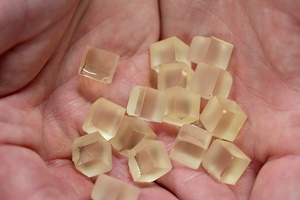 Researchers at the U.S. Department of Energy’s National Renewable Energy Laboratory (NREL) have identified a feasible path towards manufacturing bio-derivable wind turbine blades that can be chemically recycled, allowing components to be reused and reducing the practice of sending old blades to landfills.
Researchers at the U.S. Department of Energy’s National Renewable Energy Laboratory (NREL) have identified a feasible path towards manufacturing bio-derivable wind turbine blades that can be chemically recycled, allowing components to be reused and reducing the practice of sending old blades to landfills.
The new resin, made from bio-derivable resources, performs as well as the current industry standard of thermoset resin blades and surpasses some thermoplastic resins designed for recyclability.
The researchers constructed a 9-metre prototype blade to demonstrate the manufacturability of an NREL-developed biomass-derivable resin, nicknamed PECAN (PolyEster Covalently Adaptable Network). The manufacturing process aligns with current methods.
The chemical recycling process enables the components of the blades to be repeatedly recaptured and reused, allowing the remanufacture of the same product. In a test, the process completely broke down the prototype blade in six hours.
Composites made from the PECAN resin maintained their shape, withstood accelerated weathering tests, and could be produced within a timeframe similar to the existing cure cycle for current wind turbine blade manufacturing.
While full-scale wind blades can reach the length of a football pitch, the prototype size effectively demonstrated the process.
Photo by Werner Slocum, NREL









